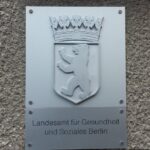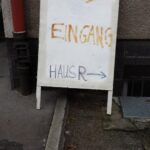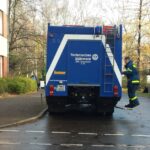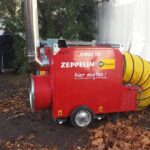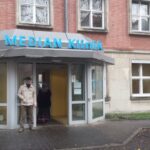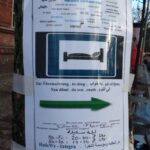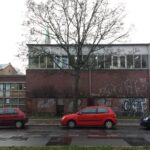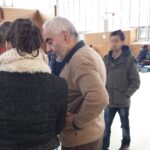Wednesday, 18 November 2015
I had to go to my hometown of Berlin for a few days for a project. My wife and children travelled with me, and I used the trip to visit my parents and sisters. Wednesday morning, my son woke me at 5:30 a.m. already. As I was unable to return to sleep, and having been curious about the conditions at the LaGeSo, I made my way over there.
After I arrived, I was lost for a good 20 minutes on the extensive compound. Similar to a university campus, the LaGeSo consists of several buildings, separated by green spaces and paths. All the buildings are labeled with letters. In between the buildings, big, white, heated tents had been erected by the THW (German civilian tech task force for disaster protection). While some were empty, others had a large number of refugees standing in them.
Eventually – it was already past eight o’clock – I came across a small group of volunteers outside building R. They said I should go to building M, to help the doctors as a translator.
At the reception, and before I could even offer my help, I was immediately pulled in to translate for the refugees lining up. As it turns out, I was the only Arabic translator present at the time. After helping out at the reception for a while, I was called into the treatment room, to translate for the doctors.
The medical area was very similar to a hospital. There was a reception, a waiting area, three treatment rooms and a common room, which the doctors shared with the volunteers.
I had a few encounters, which I would like to recount here. Any medical details, which allow identification of individuals, have been omitted.
Situation 1
A woman is at the reception, asking for a certificate so that she would not have to queue up again. Her infant is running a high temperature and it is very windy outside. Her brother, whom I am guessing to be about 20 years old, is with her. “Your brother can stay at the refugee center with the baby while you wait here”, says the young woman at the reception.
“But I am still breastfeeding the baby”, the Syrian mother replies blankly.
“Then she should pump milk”, the young receptionist suggests. Having children of my own, I know full well how difficult this situation can be, especially given that the concept of “pumping milk” is not necessarily known in Syria. At the same time, I cannot see the young brother staying on his own with the baby. So I suggest that the mother should be allowed to speak to a doctor, so that they can decide a possible hardship case.
Finally the woman sits down in the waiting area with a number.
Situation 2
A man arrives with his son and his wife. He explains that his son had knee surgery, and shows a picture of the operated leg as a proof. He is asking for a certificate in order to avoid having to wait in the queue.
“Why would he need to wait in line at all?”, the receptionist asks.
“So that the money is paid out to me”, he says and I translate.
“But he can do that on his own and does not need to bring his son and wife”, she explains to me, and I then let him know.
However, he still seems unsure and says “but they told us that all of us needed to show up.
“Yes, initially for the registration. But not for the payment.”
Situation 3
A man sits in the waiting room and wants to be admitted as a hardship case. Originally from Damascus, a bomb exploded near him. Through the explosion and the splitters he had been injured in several places, though the wounds had healed somewhat. Nevertheless, he doesn’t feel he can wait standing up for 14 hours. The doctors examine him a few times and contemplate for quite some time. However they come to the conclusion that he is not a hardship case.
“But I am not able to stand for more than half an hour at a time. And in addition, we are standing so squeezed, and people are pushing and shoving. I am sure I will injure my leg again”, he protests.
“Aren’t there are any seats?” asks the female doctor.
He smiles weakly and says “no, there aren’t. There are metal barriers everywhere against which we are pressed. And there is a lot of pushing.”
When the doctors leave the room for a little while, he pleads with me “please brother, speak with them. Try to convince them.”
“I have told them everything. I am only the translator. The decision has to be made by the doctors”, I explain to him, adding that the doctors would like to consider many as hardship cases, but only a limited number of patients per day may be classed as such.
“A bomb exploded in front of me. Look at my body. What else has to happen so that I am classified as a hardship case?”
When the female doctor only offers him a pain tablet, he refuses angrily, grabs his things and leaves with a grim face.
Situation 4
A man wants to be recognized as a hardship case. He is walking on crutches, as one of his legs has been paralyzed since his childhood. He says: “Since 11 p.m., the whole night long, I waited outside. When the gates opened at 5 a.m. all the young men ran to get a place in the queue. I did not stand a chance with my leg.”
The female doctor examines him briefly and decides to issue a hardship case paper.
Upon leaving the treatment area, he excitedly shouts to his companion in the waiting room: “I got it! I got the certificate.”
Situation 5
At the LaGeSo, the Caritas, with their offices in immediate proximity of the treatment rooms, is responsible for the admission of hardship cases. I am asked to translate for a family, in order to properly assess their situation. Father and mother are relatively young. I am guessing them to be 30 at most. With them is a small, maybe one year old child, with a severe handicap, and a healthy, three year old girl.
“My children and I currently live in a sport hall. A sport hall for basketball. I want to leave from there. As you can see, my daughter is handicapped, and she is ill. It is not an appropriate accommodation for her,” explains the mother.
“Look, I drew mom….and dad”, interrupts the older, healthy child, as she draws a stick figure on a paper. I admire the drawing and think to myself that it could be a drawing by my daughter.
“And besides, I was sent to Berlin, even though at the border it was noted down, that my husband is in…“, she pauses and tries to remember the name, unsuccessfully. “Say already, what is the city called?” she prompts her husband.
He hesitates, but then says “Wismar (I am not sure anymore if it was Wismar), that’s the name of the city. It is difficult for her to take care of the children on her own. I could help her if she were with me. But like this, it is not possible.”
“Oh… “ interrupts the little girl once more. “I forgot the arms.” And so she adds two arms to the drawing of the dad, who thus far consisted only of a head and very long hair.
“But your dad is also missing the legs. Where are his legs?” I ask her. Thoughtfully she looks at her drawing, and then continues drawing.
“Why are you in Wismar?” I ask the father. “Were you separated at the border?”
“No, I have been here since four months and wanted to apply for the family to follow“, he says.
I look over at his wife and ask her: “But you decided to come here with a boat and not the wait for the official family reunification?”
“Yes, that would have taken too long. The procedures are complicated. So the children and I left,” she says, as if it was the most normal thing.
What a crazy situation I think to myself. The strong man goes to save his family. But he is hampered because it takes too long, and every minute counts in Syria. So the wife takes matters into her own hand and goes on the journey on her own with the two children.
“Look, I drew a policeman,” says the girl and points to the paper.
“Is that a mean or a nice policeman?” I ask her.
“He is nice!” she replies and continues drawing.
Situation 6
I am once again with the doctors. A man explains to me that his daughter is very ill, and that he needs a certificate for the upcoming appointment. From his accent I notice that he is from Egypt. When I ask him about it he says:
“Yes, I am Egyptian.”
“Why did you flee?”
“My daughter is very ill and needs heart surgery. In Egypt, no one will pay for the surgery. So I sold everything I had and came here.”
“Which way did you come? Across the sea?”
“We boarded a boat in Alexandria and were on open waters for seven days until we reached Italy.”
“Seven days? Why so long?”
“The way from Alexandria to Italy is very far. It simply takes longer.”
“So it was not a rubber boat, was it?”
“No, it was an old fishing boat, made of wood. Not necessarily deep sea material. We were 450 people on board. At the end, a boat from the Red Cross accompanied us to the coast.”
Situation 7
A corpulent man has problems with his knee and tries – as do many others – to be recognized as a hardship case. He is unable to stand for an extended amount of time, so the long, often hourly-long wait in the queue is torture for him. The doctors examine him and decide that he does not classify as a hardship case. In a last attempt he says to me “Tell him (meaning the doctor) that I am a calligrapher. If he gives me the certificate then I will make many art pieces for his apartment.”
The doctor laughs and replies: “That is kind, but unfortunately I have no space in my apartment.”
The man gives it another try: “Tell him I am an Arabic teacher, and would also give him free Arabic lessons.”
Everyone grins and the doctor says: “Unfortunately I would not have the time for that.”
In the sleeping area
Around 11 o’clock things have died down. A Saudi-Arabian female doctor is supporting the team of doctors and a Syrian refugee, who also speaks English, helps with the translation. I say goodbye and start to leave. Outside the exit of the LaGeSo I notice a sign hanging on a tree, informing of sleeping facilities nearby. From the sign it is clear that the HaDeWe is managing these sleeping facilities. The HaDeWe is a non-profit education and mosque society, which I know well from the time I lived in Berlin. Having taught Arabic to children and attending their religion classes as a youngster myself, I decided to check out these premises.
It is basically a sport hall, just opposite the LaGeSo, which now services as emergency accommodation. The sport hall is filled with refugees. The majority are sitting on the floor, or on thin camping mats. There is a table with sandwiches in the middle of the room, and a man serves tea. I see a German army cot behind a red curtain.
Upon arrival I meet Abdullah Hajjir, the never tiring head of the HaDeWe. The now grey-haired Palestinian does not immediately recognize me, even though he has known me for long. We briefly talk, but he does not have much time for me. He rushes from right to left; refugees come up and ask him questions.
While I am there, a doctor walks past with a few assistants and an emergency medical bag. I recognize him as the same doctor who had been offered the Arabic calligraphy earlier. “The situation over there has calmed down. So I decided to check here if anyone needed emergency medical treatment.”
Later

On my way back home I pass the LaGeSo once more. By now it is 1 p.m. Several men are standing outside the entrance, approaching refugees with small green books, attempting to hand them out. As I get closer, I am presented with a book as well. It is an Arabic version of the New Testament. The first page reads “The Gideons International are a Christian community, consisting of business people, experts and believers from over 180 countries (…) to distribute the bible, so that everyone recognizes God Jesus Christ as their personal redeemer.“
The second part of my visit to LaGeSo, this time at night, can be found here.
Translated by Astrid


